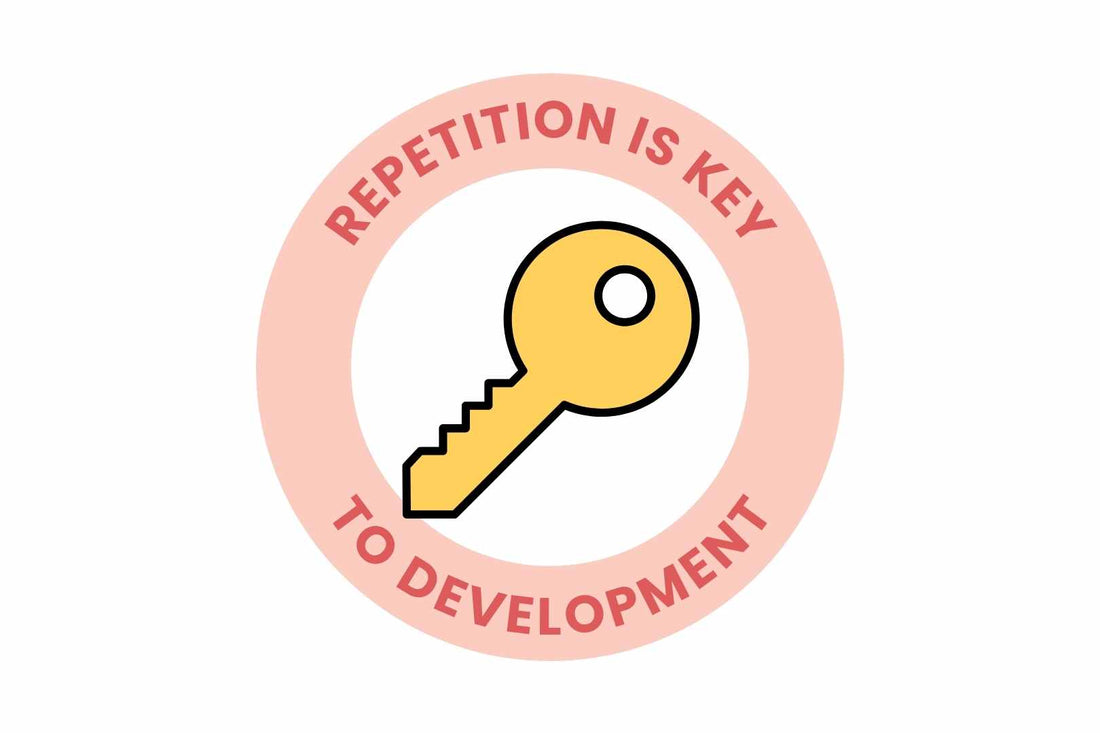
Why Repetition is Key for Speech and Language Development
Share
If you've ever found yourself saying the same word or phrase a million times to your little one, welcome to the club! As a pediatric speech-language pathologist, I joke that “broken record” should probably be listed in my job description. I spend entire sessions focusing on words like “go” and “stop” on repeat. Why do I do it? Because repetition is an absolute game changer when it comes to speech and language development!

Picture this: Your toddler is rolling cars back and forth, and you’re saying “go, go, go!” or “stop!” over and over. It might feel a little silly at first, but trust me, this repetition is helping solidify those words in their growing vocabulary. You’re not just playing—you’re teaching, and that’s amazing.

So, here’s the secret: when you repeat words, sounds, and phrases, you’re doing something incredibly beneficial for your child’s speech and language development. Go you, superstar parent! 🙌
Repetition plays a huge role in helping kids understand and produce language. Whether they’re learning their very first words (so exciting!) or practicing tricky speech sounds, repetition gives them the exposure and practice they need to grow. In this post, we’ll explore why repetition works, how you can incorporate it naturally into your day, and a few fun ways to make it part of your family’s routine. Let’s dive in!
The Science Behind Repetition
Kids learn through exposure. Think of their brain as a filing cabinet—each time they hear a word, it’s like you’re adding a file to the “language” folder. The more times they hear that word, the thicker and stronger the file gets, making it easier for them to understand and use it.
Repetition helps because it...
...boosts understanding. Hearing a word repeatedly helps kids connect it to its meaning. For example, when you wave and say “bye-bye!” every time you leave, they begin to associate the word with that scenario.
...improves pronunciation. Kids get lots of chances to practice forming sounds correctly when they hear them over and over. Over time, they refine their speech based on what they hear and say.
...builds memory. Repetition helps move information from short-term memory to long-term memory. That’s why your toddler might shout “cookie!” the next time they see one after hearing it a few times (and yes, they’ll definitely remember that word!).

Why Repetition is Especially Important for Speech Delays
If your child is working through a speech delay or practicing specific sounds, repetition becomes even more of an essential tool. It provides the extra practice and confidence they need to improve. Here’s how it helps:
1) It gives them a clear model of how a sound should be made (a little like a speech “cheat sheet”).
2) It lets them hear and practice the sound in different words and contexts.
3) It builds consistency, so they feel more confident producing the sound in conversation.
How to Use Repetition in Everyday Life
The best part about repetition? It’s something you’re probably already doing! And it fits perfectly into your daily routines. Here are some playful, easy ways to sneak in some extra repetition:
- Playtime: Grab those toys and repeat words like “car,” “block,” or “doll.” Narrate the action: “Push the car! Car goes fast! Where’s the car?” (Bonus: Your child learns while you show off your future audiobook narrator voice.)
- Storytime: Read books with repetitive phrases, like Brown Bear, Brown Bear, What Do You See? Pause before repeating a phrase to let your child fill in the blanks—it’s magical when they start doing it on their own! I do a happy dance every time this happens in my therapy sessions.

- Songs and Rhymes: Show off that beautiful singing voice of yours with classics like “The Wheels on the Bus” or “Old MacDonald.” Repetitive lyrics make learning fun, and if you’re off-key, don’t worry—your toddler won’t judge. Probably.

- Interactive Speech Books: My speech sound books like Pete the Puppy or Don the Dino are designed to make repetition playful and engaging. They encourage kids to practice specific sounds through fun, interactive prompts!
Consistency is Key
Here’s the truth: repetition works best when it’s consistent. Try working on target words or sounds daily—even if it’s just for a few minutes during snack time or before bed. Those small, regular moments add up in a big way!
Repetition isn’t just about saying the same thing over and over—it’s a powerful, meaningful way to help your child build their speech and language skills. By weaving it into your everyday routines in fun, creative ways, you’re setting your child up for success.
If you’re looking for extra tools to make speech practice easier (and more fun), be sure to check out my interactive speech sound eBooks. Designed with repetition and engagement in mind, they make learning an adventure for both kids and parents. Let’s keep making magic happen—one word at a time!
✨ I’d love to hear from you! Share your favorite repetition activities or let me know how my books are helping your child in the comments below. Your feedback helps me create even more resources that families love! 💬
Cheering you on,
Shannon Rumpf, M.S. CCC-SLP
Play on Words Publishing
